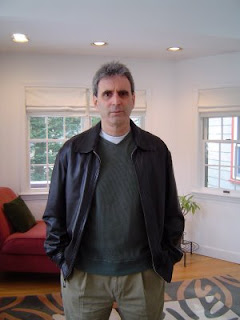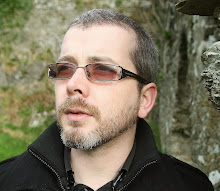
After working for over 20 years as a software engineer,
Q1. What are you writing at the minute?
I’ve just finished a high concept thriller titled “Dying Memories”. This one’s got all the requisite ingredients to get me into a larger NY house; an especially nasty government agency developing a drug that will endanger the free world as we know it, and the hero who gets caught up in all this and saves the world after many bruises, bumps, and gunshot wounds along the way. Even has a bloody cat in it! I’m sure I’m going to be hearing from friends who will be accusing me of selling out, but as long as they’re doing it while seeing my book in supermarkets and in Walmarts, fine, I can live with that.
Q2. Can you give us an idea of
About a year ago I quit working as a software developer and am trying the fulltime life of a writer, so my typical day goes something like this:
1) Wakeup
2) Make some tea
3) Write for 4-5 hours
4) Hear from my agent that yet another editor at a large NY house was blocked in bringing in one of my books because the consensus was that it was too dark and violent for their readers.
5) Punch a hole in the wall.
6) Get an earful from the wife about the hole in the wall.
7) Take out the blueboard, replaster, sand and repaint damaged wall.
8) Think about writing some more, but am too tired.
9) Have a few drinks as I contemplate my next day of writing and plastering.
Q3. What do you do when you’re not writing?
I started studying Kung Fu a while back, and now hold a black belt and am working towards my second degree, so I usually go to at least one class a day, as well as Tai Chi classes. Other than that, boring stuff like fixing holes in walls.
Q4. Any advice for a greenhorn trying to break into the crime fiction scene?
This is a tough one to answer and depends what the writer is trying to accomplish. Be prepared up front that things usually take a long time—the publishing world does not move fast. You need patience and persistence. This is a business where it’s very easy to get discouraged, and the best way to battle that is always be working on something. Worse thing to do is send out something and wait—after you send it out, forget about it and start working on your next project. And listen to what people, like agents, are telling you. Large NY publishers like to play it safe when it comes to crime fiction; every once in a while a true noir book will escape from them, but the sad fact is if you persist (as I’ve done) in writing dark crime fiction, you’ve got a long hard road ahead of you.
Q5. Which crime writers have impressed you this year?
This has been more of a retro year for me; been reading Derek Raymond’s fantastic factory series books, and a lot of Donald Westlake—The Ax is just brilliant. Also
Q6. What are you reading right now?
Mixed Blood by Roger Smith. Just picked it up today. So far so good.
Q7. Plans for the future?
I’ve written eleven books so far, none of which have taken more than a day or so of research. My next book is going to be the retelling of a classic tale with my own unique spin and perspective, and it’s going to take a ton of research. I’ve got a dozen or so books already stacked up that I need to read, and more will probably be following, but this is a book I’m very excited about writing. So I’m going to be busy with this, as well as keeping my eyes open in case Whitey Bulger ever gets his hands on a copy of Pariah…
Q8. With regards to your writing career to date, would you do anything differently?
I try not to have regrets in life. It’s been a long road to get to where I am now, but on the other hand, I’m writing the types of books I want to write, and I’m with a great house with Serpent’s Tail. So with all my blunders and mistakes along the way, things somehow worked out.
Q9. Do you fancy sharing your worst writing experience?
Like a lot of writers, I’ve had more than my share of rejections and close calls, but that’s all part of the game. I’ll share instead my most stressful writing experience. When I first approached
Months passed, a lot of months. I told John ahead of time that I’d be showing Small Crimes to other publishers also, and he was fine with that, and I ended up sending the book to Five Star. The thing with Five Star is they’re a small publisher who basically sells mostly to libraries—their pricing and discount policy doesn’t really allow much else. They’re a professional outfit, a good group of people, but their books are going to sell between 500-1500 copies based on the book’s trade reviews. They ended up accepting Small Crimes, and still no word from Serpent’s Tail. At this point I was leaving it up to my agent back then to contact Serpent’s Tail, and he was telling me they weren’t returning his emails. I pretty much decided if I sold Small Crimes to Five Star, that was it, I’d get the book in print, and then quit writing for good. It just wasn’t worth it anymore. I pushed things out as long as I could, then signed the contracts and sent them back to Five Star. Three days later
The next few weeks were tough ones, sweated off several pounds, but fortunately the Five Star folks turned out to be really decent people, and they let me exchange Bad Thoughts for Small Crimes, and the rest is history.
Thank you, Dave Zeltserman!




4 comments:
What cracking answers! Very inspirational and eye-opening too.
I wonder if the holes in the walls are deeper now Dave's a black belt.
Mike - It is a brilliant set of answers, isn't it?
I'd say he's definitely using more Polyfil than he used to.
Cheers
gb
Great interview Gerard. Dave is awesome! He's easily one of the most approachable novelists out there and has more war stories about writing and publishing. It's great to see him succeeding after so many years of struggle. He's proof persistence truly pays off in the long term.
Keith - You're right, Dave is one cool cat. I very much enjoyed the email exchange that came from this interview, especially when the topic turned to kung fu. Writing and martial arts? You don't get conversations like that too often.
Cheers
gb
Post a Comment